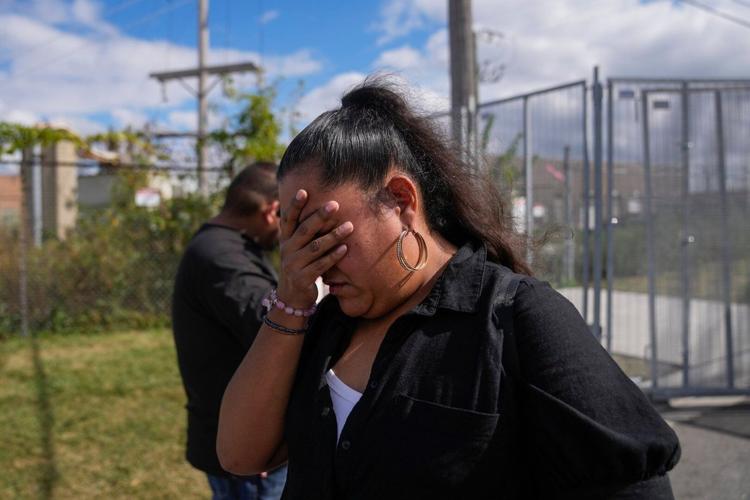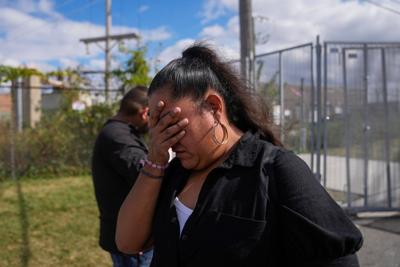CHICAGO (AP) ŌĆö A boarded-up building in a small Chicago suburb has become the front line of a federal immigration crackdown, with growing accusations that the facility meant to process arrestees is a de facto detention center plagued by inhumane conditions.
The Trump administration has the Chicago area for its latest immigration enforcement surge touting in the past three weeks.
Relatives, lawyers and activists are concerned by immigrants’ accounts of what happens once they are inside the brick building in Broadview. Once routine protests outside the building have grown in recent weeks, with federal agents using chemical agents and physical force to back.
Advocates say up to 200 people are being held there at a time, with some held up to five days in a space that doesnŌĆÖt have showers or a cafeteria. Immigrants report they are being given little food, water and limited access to medication. Communication, including with attorneys, is limited.
ŌĆ£ItŌĆÖs a black hole,ŌĆØ said Erendira Rend├│n of The Resurrection Project, which has received requests for legal help from nearly 250 arrested immigrants. ŌĆ£You canŌĆÖt call the center. You canŌĆÖt talk to anybody.ŌĆØ
The U.S. Department of Homeland Security on Thursday called the claims on the conditions false, adding that ŌĆ£detainees are briefly processed” before they are transferred.
Questions loom over center
Broadview, a suburb that’s home to about 8,000 people, has also been the site of the federal immigration processing center for decades. Located along an industrial corridor, the facility has frequently prompted and become the scene of tearful goodbyes before people are deported.
But questions surrounding its use have grown since President Donald Trump returned to the White House promising mass deportations.
Illinois has among the nationŌĆÖs strictest sanctuary laws, widely barring cooperation between local police and federal immigration agents, including for detention.
The state effectively banned immigration detention in 2021, when it between the federal government and county jails. Illinois in 2019 following failed attempts to build a new detention facility and there are no federal immigration detention centers in the state.
Illinois officials have alleged for months that immigrants are held at the processing center for days and told to sleep on floors, including in the bathroom.
U.S. Rep. Jesus ŌĆ£ChuyŌĆØ Garcia was part of a group of Illinois Democrats who tried to tour the facility in June.
ŌĆ£We pointed out that this has been a processing center, but in fact people who have been in detention there for multiple days have shared with us that it in fact is a detention center,ŌĆØ he said. ŌĆ£It is not adequate to be a detention center.ŌĆØ
Limited food and crowded quarters
Brenda Perez said her husband was arrested this month by ICE agents on ChicagoŌĆÖs South Side while he heading to work as a mechanic. She eventually confirmed he was at Broadview when she saw him on a social media video shot outside the center.
In brief calls, he told her he couldnŌĆÖt sleep because there were too many people to lay down. He reported going 24 hours without food.
ŌĆ£He would beg them for food and water because he was hungry and very thirsty and they would just ignore him,ŌĆØ she said, crying. He was later taken to a Michigan jail.
Immigrant rights advocates also claim the Trump administration is trying to make conditions unbearable so that people agree to . Authorities are trying to in nearby cooperating jails, including in Indiana.
Giselle Maldonado, 23, said her two uncles were held at the Broadview facility for two days last week before they were deported to Tijuana, Mexico.
Maldonado described the conditions as ŌĆ£ugly,ŌĆØ and contributed to them signing deportation papers quickly rather than advocating for themselves.
ŌĆ£It was crowded,ŌĆØ she said. ŌĆ£They wouldnŌĆÖt feed them right. They wouldnŌĆÖt give them water when they asked for water. These bright lights were on 24/7, and they couldnŌĆÖt sleep.ŌĆØ
U.S. Immigration and Customs Enforcement has denied recent tour requests due to ŌĆ£operational security.ŌĆØ While the agency publishes how many people are in detention centers, the Broadview processing center isnŌĆÖt listed.
Tricia McLaughlin, the assistant secretary at DHS, rejected claims of ŌĆ£subprime conditionsŌĆØ Thursday and said the facility isn’t used for detention.
ŌĆ£Detainees are briefly processed before being transferred to detention facilities,ŌĆØ she said. ŌĆ£All detainees are provided with proper meals, medical treatment, and have opportunities to communicate with lawyers and their family members.”
Clashing with the community
The center has created headaches for village leaders. While the community about 12 miles (19.31 kilometers) from Chicago is small, its businesses can draw as many as 55,000 workers.
Members of Broadview’s 25-officer police force are increasingly diverted to the center to help manage protests.
Tensions have flared in recent weeks. Protesters have blocked vehicles, and federal agents have responded with aggressive tactics, including deploying chemical agents and physical force. Armed guards patrol the roof.
ŌĆ£We have this processing center in our town and it creates fear,ŌĆØ said Broadview Mayor Katrina Thompson.
The Department of Homeland Security has defended its tactics, citing danger to federal officers and characterizing the arrestees as ŌĆ£rioters.ŌĆØ
Federal officials initially gave Thompson a that the center would be used as the ŌĆ£primary processing locationŌĆØ for the operation. But communications have since been limited, including ignored requests to be informed if chemical agents would be used.
Federal officials have boarded up windows on the building, which prompted city reviews of building codes. After protests became tense, federal authorities erected a fence overnight that extends onto a public roadway.
Village officials demanded the ŌĆ£illegally builtŌĆØ fence be removed over security concerns from the fire department. It remained in place on Thursday.
The office of the Mexican consulate is among the few entities in communication with authorities overseeing the Broadview facility. TheyŌĆÖve helped Mexican nationals who are detained get medicine.
Ambassador Reyna Torres Mendivil, the consul general of Mexico in Chicago, declined to discuss specific details, citing diplomatic process. But she said that the ramped up immigration enforcement circumstances among Mexican nationals are unprecedented.
ŌĆ£The suffering we are seeing is considerable,ŌĆØ she said.
__
Associated Press reporter Christine Fernando contributed to this report.





























